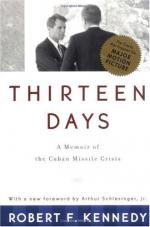
|
| Name: _________________________ | Period: ___________________ |
This test consists of 5 multiple choice questions, 5 short answer questions, and 10 short essay questions.
Multiple Choice Questions
1. What did Robert promise to do with his daughters on October 28th?
(a) Go to a Horse Show.
(b) Buy Halloween costumes.
(c) Go shopping.
(d) Attend the theater.
2. What does the change in attitude from the letter received on the 26th and the letter received on the 27th suggest?
(a) Desire for war.
(b) Translation mistakes.
(c) Deception.
(d) Soviet confusion.
3. Who does JFK write to after the Russians agree to remove missiles from Cuba?
(a) Castro.
(b) Khrushchev.
(c) Mrs. Anderson.
(d) Mrs. Onasis.
4. Who was approached by a Soviet Embassy official to offer a proposal for removing the missiles from Cuba?
(a) JFK.
(b) Robert.
(c) John Scali.
(d) Sorensen.
5. What feeling does Robert believe Congress and the country is turning to but should not?
(a) Marxism.
(b) Communism.
(c) Inclusion.
(d) Isolationism.
Short Answer Questions
1. Who said "I am not going to follow a course which will allow anyone to write a comparable book about this time, The Missiles of October" (98)?
2. Who urged the President to release photos of missiles to the UN for publication?
3. What extended metaphor does Khrushchev use to conclude his letter from October 26th?
4. Whose job does Robert believe is getting bigger and is in actuality five jobs under one title?
5. Who wrote the Afterword for Thirteen Days?
Short Essay Questions
1. Why did JFK choose the Marucla for the first vessel to be boarded?
2. Why does Robert claim that "we cannot be an island even if we wished; nor can we successfully separate ourselves from the rest of the world" (94)?
3. According to Robert, how did time before the crisis was publicized effect the President's decisions?
4. How did Africa play a role in the Cuban Missile Crisis?
5. Why does Robert believe that a devil's advocate is necessary for the President?
6. How was the official letter sent by the Soviets on October 27th different from the letter sent October 26th?
7. Who did JFK seek advice from? Why?
8. What made the prospect of war unbearable to JFK?
9. What does Robert tell is the final lesson learned in the Cuban Missile Crisis?
10. While still in communications with Khrushchev, RFK writes that "both 'hawks' and 'doves' sensed that our combination of limited force and diplomatic efforts had been unsuccessful" (64). What do the symbolic terms "hawks" and "doves" stand for?
|
This section contains 1,220 words (approx. 5 pages at 300 words per page) |

|




